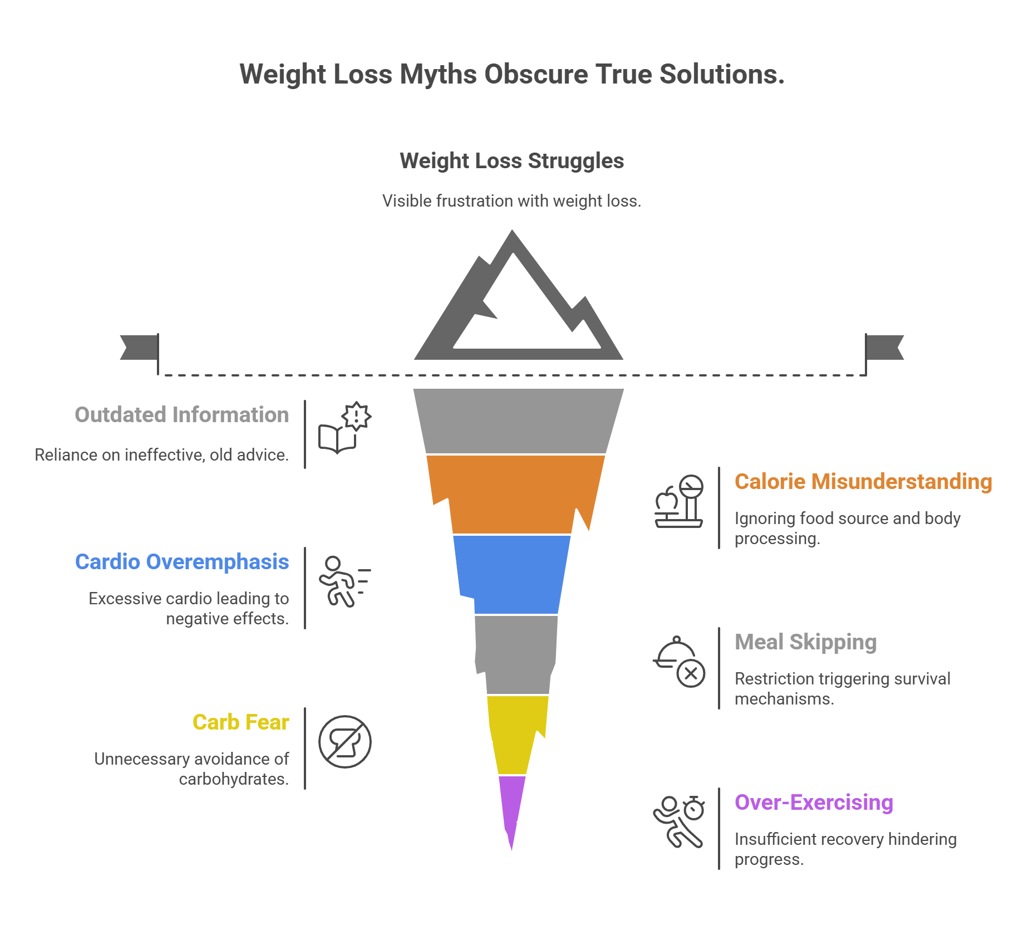5 Weight Loss Myths Holding You Back After 30
Still doing endless cardio or skipping meals? Bust the most common fitness and diet myths for adults in their 30s and 40s.
Loraine Berriman
7/15/20255 min read


You've tried everything. The latest fad diet, that trendy workout everyone's raving about, maybe even those "miracle" supplements your colleague swears by. Yet here you are, still struggling with the same weight loss goals you set months ago.
Here's the thing: you're not failing. You're just fighting against outdated information that's keeping you stuck. After 30, your body changes, your lifestyle shifts, and what worked in your twenties simply doesn't cut it anymore.
The Reality Check You Need
Weight loss after 30 isn't harder because you're "getting old." It's harder because you're probably following advice that was never right in the first place. "Your metabolism tends to slow down as you get older," says NIH's Dr. Rafael de Cabo, an expert on aging. "But your appetite and your food intake do not."
This creates a perfect storm where traditional weight loss approaches become counterproductive. Let's break down the five biggest myths that might be sabotaging your progress.
Myth #1: All Calories Are Created Equal
The Lie: "Just eat less and move more. A calorie is a calorie."
The Truth: Your body processes different foods completely differently.
Think about it. Does 200 calories from an avocado really affect your body the same way as 200 calories from a candy bar? Scientific evidence shows that the source of calories matters. "An avocado that contains 200 calories of healthy fats and fiber is better than the same calories from a bag of chips," explains nutrition experts.
What Actually Works:
Focus on nutrient-dense whole foods
Prioritize protein to maintain muscle mass
Include healthy fats to support hormone production
Choose complex carbohydrates for sustained energy
Picture this: Sarah, a 35-year-old marketing manager, spent months counting calories religiously. She'd save calories for wine and dessert, then wonder why she felt constantly hungry and irritable. When she shifted to eating quality foods without obsessing over numbers, she lost 15 pounds in three months.
Myth #2: Cardio Is the Ultimate Fat Burner
The Lie: "Do more cardio to lose weight faster."
The Truth: Endless cardio can actually work against you after 30.
You know that person who runs for hours but never seems to change their body composition? That's because excessive cardio can increase cortisol levels, break down muscle tissue, and leave you ravenously hungry.
The Smart Approach:
Incorporate strength training 2-3 times per week
Add high-intensity interval training (HIIT) for efficiency
Keep steady-state cardio moderate and enjoyable
Focus on building lean muscle mass
Consider Mark, a 42-year-old father who traded his daily hour-long runs for three weekly strength sessions and two short HIIT workouts. Not only did he lose 20 pounds, but he also gained energy to keep up with his kids.
Myth #3: Skipping Meals Speeds Up Weight Loss
The Lie: "Skip breakfast, eat tiny portions, fast for days."
The Truth: Extreme restriction triggers your body's survival mechanisms.
When you severely restrict calories, your body doesn't think you're dieting. It thinks you're starving. This slows your metabolism, increases hunger hormones, and makes you more likely to binge later.
The Balanced Strategy:
Eat regular, satisfying meals
Include protein at every meal
Don't let yourself get overly hungry
Consider intermittent fasting as a tool, not a punishment
Lisa, a 38-year-old teacher, used to skip breakfast and eat salads for lunch, then devour everything in sight by evening. When she started eating three balanced meals plus snacks, she naturally began losing weight without the constant mental battle.
Myth #4: Carbs Are the Enemy
The Lie: "Cut carbs completely for fast results."
The Truth: Your body needs carbohydrates, especially if you're active.
The Dietary Guidelines for Americans have estimated daily calorie needs based on a person's age, sex, and physical activity level. Grain products such as bread, pasta, and rice are not inherently fattening. The problem isn't carbs themselves, but the type and timing.
Carb-Smart Guidelines:
Choose complex carbohydrates over simple sugars
Time carbs around your workouts
Include vegetables as your primary carb source
Don't fear whole grains and legumes
Take David, a 45-year-old office worker who eliminated all carbs and lost 10 pounds quickly. Within six weeks, he was exhausted, irritable, and had gained back 15 pounds after inevitable carb binges. A balanced approach with quality carbs led to sustainable 25-pound weight loss.
Myth #5: You Need to Exercise Every Day
The Lie: "More is always better when it comes to exercise."
The Truth: Recovery is when your body actually changes.
Over-exercising after 30 can increase injury risk, elevate stress hormones, and prevent proper recovery. Your body needs time to repair and adapt to training stimuli.
The Recovery-Forward Approach:
Aim for 3-4 quality workouts per week
Include at least two full rest days
Prioritize sleep and stress management
Listen to your body's signals
Progressive Training Structure:
Week 1-2: Build consistency with 3 workouts
Week 3-4: Add intensity gradually
Week 5-6: Include variety and challenges
Week 7: Deload and recover
The Real Solution: A Sustainable Framework
Instead of falling for these myths, here's what actually works for lasting weight loss after 30:
Nutrition Foundation:
Eat enough protein (0.8-1g per pound of body weight)
Include healthy fats (20-30% of calories)
Choose nutrient-dense carbohydrates
Stay hydrated and manage stress
Movement Strategy:
Strength training for muscle preservation
Cardio workouts you enjoy
Daily movement through walking or activities
Adequate rest and recovery
Lifestyle Integration:
Prioritize sleep quality (7-9 hours)
Manage stress through relaxation techniques
Build supportive social connections
Create sustainable habits, not quick fixes




Your Next Steps
Stop fighting your body and start working with it. Choose one myth you've been believing and make a small change this week. Maybe add a strength training session, include more protein at breakfast, or simply stop feeling guilty about eating carbs.
Remember, weight loss after 30 isn't about perfection. It's about consistency, patience, and treating your body with the respect it deserves. You've got this, and your body is ready to respond when you give it what it actually needs.
The best time to start was yesterday. The second best time is right now. Which myth are you ready to leave behind?
Further reading on TheFitnessEdit.co.za: 'The Ultimate Guide to Losing Body Fat.'
You can also read about 'Top 10 Weight Loss Mistakes.'
Key References
National Institute on Aging Research: Dr. Rafael de Cabo's Research Profile - Leading research on aging, metabolism, and caloric restriction effects
Mayo Clinic Carbohydrate Guidelines: Carbohydrates in Healthy Diet - Evidence-based information on carbohydrate consumption
National Institute on Aging Translational Gerontology Branch: Research Programs - Current studies on aging, metabolism, and nutritional interventions
Physicians Committee for Responsible Medicine: 2020-2025 Dietary Guidelines Analysis - Independent analysis of current dietary recommendations


The information provided in this blog post is intended solely for informational purposes. It is not meant to replace professional medical advice, diagnosis, or treatment. Consult health care providers for personalised medical advice and treatment options related to specific health concerns.
About The Author
Loraine is an International Personal Trainer certified through Trifocus Fitness Academy (South Africa). She believes fitness should be accessible to everyone, regardless of age or starting point, and focuses on creating programs that fit real lives, not the other way around.
© 2026 Elevate Wellness Co. Pty Ltd. All rights reserved


